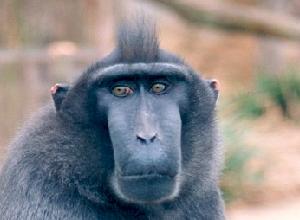
Wednesday, August 30, 2006
The Daily Hump: Macaca
 By now you've probably heard the story. Republican Senator George Allen mocked S.R. Sidarth, an aid of Allen's political opponent. Specifically, he referred to Sidarth as "macaca," which, unbeknownst to most Americans, is sometimes an ethnic slur. Allen has apologized profusely saying this "was a mistake."
By now you've probably heard the story. Republican Senator George Allen mocked S.R. Sidarth, an aid of Allen's political opponent. Specifically, he referred to Sidarth as "macaca," which, unbeknownst to most Americans, is sometimes an ethnic slur. Allen has apologized profusely saying this "was a mistake."Regardless of Allen's motivation and the word's actual definition, macaca is rather amusing for two key reasons:
1) Any word that contains the repetition of syllables (reduplication) fosters humor. Think poopoo.
2) Caca is funny, thus macaca is also funny. I call this "the syllogistic effect of funny words"--if you have an indisputably funny word (Word A) and then you have a longer word (Word B) which contains Word A, then Word B is also funny, regardless of definition or whether it's even linguistically related to Word A. Examples: caca/macaca, poo/Winnie the Pooh, pee/Peter, shit/shitake, cock/macaque, anus/Uranus, anus/Mianus, etc...
But, back to the definition. According to the OED, the word Macaca is actually the genus of the group of monkeys known as macaques. Macaques include rhesus monkeys and Barbary apes (which although has no record of being an insult, would make a great one). Macaque is rooted in the Portuguese macaco where it means monkey or ape. Interestingly, the history of the word stretches even further back to an onomatopoeiac root. Per the OED:
The form kaku is the name for the mangabey (a Central African forest-dwelling monkey) in a number of Bantu languages of southern Gabon and the Congo, and is generally regarded as imitative of the animal's cry. The plural is kaku, bakaku, or makaku, according to the language.So macaca can best be described as a plural form of the Bantu kaku, which is a type of monkey so named for its cry. Kaku!
Beyond Macaca [The Nation]
Labels: Bantu, Portuguese, The Daily Hump
:: posted by David, 9:10 AM